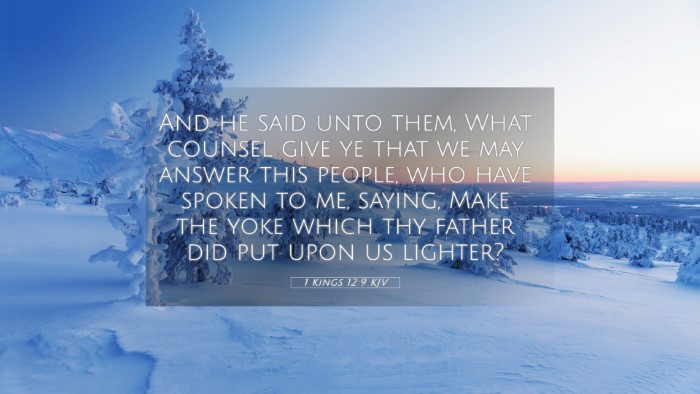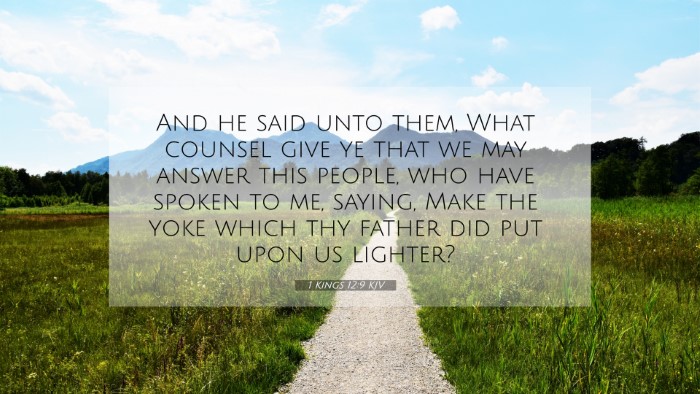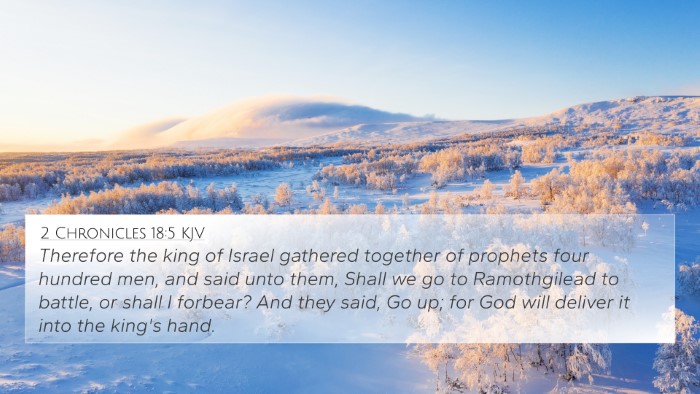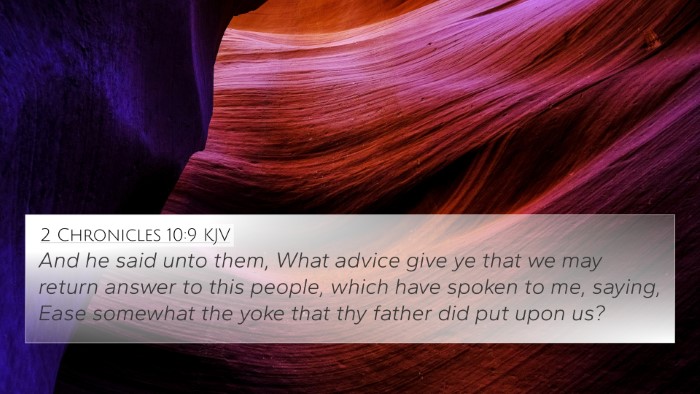Understanding 1 Kings 12:9
Bible Verse: 1 Kings 12:9 - "And he said unto them, What counsel give ye to me, that I may answer this people, who have spoken to me, saying, Make the yoke which thy father did put upon us lighter?"
Context of 1 Kings 12:9
This verse occurs during a pivotal moment in the transition of leadership from Solomon to his son Rehoboam. The people of Israel, feeling the burden of heavy taxation and labor imposed by Solomon, approach Rehoboam seeking relief.
Commentary Summary
Insights from public domain commentaries provide a layered understanding of this verse:
- Matthew Henry's Commentary:
This commentary highlights Rehoboam's challenging position as he is presented with the people's request. It emphasizes the need for wise counsel and the importance of leadership in addressing the concerns of the people. Henry suggests that Rehoboam's initial decision-making process reflects common pitfalls leaders face: leaning towards arrogance over humility.
- Albert Barnes' Notes:
Barnes points out that this request for a lighter yoke symbolizes the people's desire for relief from oppressive governance. He identifies the counsel Rehoboam sought as crucial, underscoring the influence of wise or foolish advice can have on leadership decisions.
- Adam Clarke's Commentary:
Clarke expands on the communal aspect of the plea, interpreting it as the voice of a disenchanted populace looking for mitigating policies. He outlines the significance of the people’s grievances and how they reflect a larger theme of governance in biblical literature.
Thematic Connections
The verse invites contemplation on themes of leadership, governance, and the importance of listening to constituents. The dynamics between Rehoboam and the Israelites draw parallels to other biblical narratives that discuss authority and accountability.
Bible Verse Cross-References
- Exodus 1:14: The burdens placed on the Israelites in Egypt as a precedent to the yoke referred to in this context.
- 1 Kings 4:7: Solomon’s governance and taxation policies that set the stage for the people's unrest.
- 2 Chronicles 10:6-7: This is a parallel account detailing the same event and the voices of the counselors.
- Proverbs 11:14: A broader principle on seeking guidance from multiple sources before making decisions.
- Matthew 20:25-28: Jesus teaches about servant leadership, contrasting with what is seen in Rehoboam's initial approach.
- Isaiah 10:27: Referencing lifting burdens, deeper insights into the interplay of oppression and freedom.
- Luke 22:24-26: The discussion of greatness in leadership reflecting humility versus a heavy hand.
Comparative Bible Verse Analysis
Understanding 1 Kings 12:9 is enriched through comparative study, revealing the nature of God’s guidance and the response of leaders in varying contexts:
- Leadership Decisions: Comparing Rehoboam's choice with David’s reliance on divine guidance (2 Samuel 2:1).
- Wisdom in Counsel: Links with Proverbs 19:20, suggesting the value of listening to and accepting counsel.
- Consequences of Decisions: The fallout from Rehoboam's choices mirrors other themes in biblical history where poor leadership leads to division (1 Kings 12:16-20).
Tools for Bible Cross-Referencing
Utilizing tools for Bible cross-referencing can significantly enhance your study and understanding of verses like 1 Kings 12:9:
- Bible Concordance: An effective resource for searching specific words and themes across the text.
- Bible Cross-Reference Guide: Helps in identifying relationships between verses systematically.
- Cross-Reference Bible Study: A methodological approach to connect various themes and verses.
- Bible Reference Resources: Comprehensive materials that enhance understanding through contextual cross-referencing.
Final Reflection
1 Kings 12:9 serves as a cautionary tale as well as a guide for leaders. It encapsulates the challenges of governance, the necessity of wise counsel, and the significance of understanding the needs of the governed. By embracing the wealth of knowledge provided through public domain commentaries and cross-referencing, one can delve into a richer interpretation of this pivotal moment in Israel's history.






